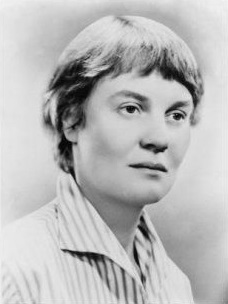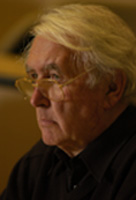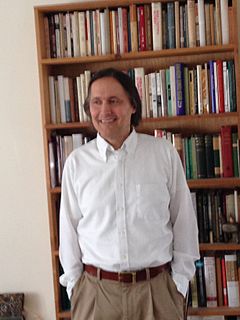Career
She has a Bachelor of Divinity (BD), specialising in Philosophy of Religion and Ethics, from King's College London. [1] She has a Doctor of Philosophy (PhD) degree from Queens' College, Cambridge, where her research focused on Don Cupitt and Iris Murdoch. [2] Her doctoral thesis was titled "The ontology of quasi-theism: a study of two twentieth century reinterpretations of the Christian faith" and was completed in 1995. [3]
In Western universities, a Bachelor of Divinity or Baccalaureate in Divinity is an undergraduate or postgraduate academic degree awarded for a course taken in the study of divinity or related disciplines, such as theology or, rarely, religious studies. In most modern universities, the BD as a first degree is essentially equivalent to a Bachelor of Arts degree with a speciality in divinity. Relatively few institutions award undergraduate Bachelor of Divinity degrees today, and the distinction between institutions that do award such degrees and those that award BA degrees for theological subjects is usually one of bureaucracy rather than curriculum.

King's College London is a public research university located in London, United Kingdom, and a founding college and member institution of the federal University of London. King's was established in 1829 by King George IV and Arthur Wellesley, 1st Duke of Wellington, when it received its first royal charter, and claims to be the fourth oldest university institution in England. In 1836, King's became one of the two founding colleges of the University of London. In the late 20th century, King's grew through a series of mergers, including with Queen Elizabeth College and Chelsea College of Science and Technology, the Institute of Psychiatry, the United Medical and Dental Schools of Guy's and St Thomas' Hospitals and the Florence Nightingale School of Nursing and Midwifery.

A Doctor of Philosophy is the highest university degree that is conferred after a course of study by universities in most countries. PhDs are awarded for programs across the whole breadth of academic fields. As an earned research degree, those studying for a PhD are usually required to produce original research that expands the boundaries of knowledge, normally in the form of a thesis or dissertation, and defend their work against experts in the field. The completion of a PhD is often a requirement for employment as a university professor, researcher, or scientist in many fields. Individuals who have earned a Doctor of Philosophy degree may, in many jurisdictions, use the title Doctor or, in non-English-speaking countries, variants such as "Dr. phil." with their name, although the proper etiquette associated with this usage may also be subject to the professional ethics of their own scholarly field, culture, or society. Those who teach at universities or work in academic, educational, or research fields are usually addressed by this title "professionally and socially in a salutation or conversation." Alternatively, holders may use post-nominal letters such as "Ph.D.", "PhD", or "DPhil". It is, however, considered incorrect to use both the title and post-nominals at the same time.
She was a Lecturer in Religious Studies at Suffolk College, Ipswich from 1992 until she came to Heythrop in 1999. From 2000-2003 she was the Course Director for the University of London BD for External Students. [1] She was promoted to Reader in Philosophy of Religion in 2017. [2]
The title of reader in the United Kingdom and some universities in the Commonwealth of Nations, for example India, Australia and New Zealand, denotes an appointment for a senior academic with a distinguished international reputation in research or scholarship.
She currently teaches an intercollegiate Philosophy of Religion course for the University of London MA Philosophy, and also teaches Interpreting Religious Language, and conducts the seminars and tutorials for Philosophy, Religion and Ethics students.

Frederick Charles CoplestonSJ was a Jesuit priest, philosopher, and historian of philosophy, best known for his influential multi-volume A History of Philosophy (1946–75).

Dame Jean Iris Murdoch was a British novelist and philosopher. Murdoch is best known for her novels about good and evil, sexual relationships, morality, and the power of the unconscious. Her first published novel, Under the Net, was selected in 1998 as one of Modern Library's 100 best English-language novels of the 20th century. In 1987, she was made a Dame Commander of the Order of the British Empire. Her books include The Bell (1958), A Severed Head (1961), The Red and the Green (1965), The Nice and the Good (1968), The Black Prince (1973), Henry and Cato (1976), The Sea, the Sea, The Philosopher's Pupil (1983), The Good Apprentice (1985), The Book and the Brotherhood (1987), The Message to the Planet (1989), and The Green Knight (1993). In 2008, The Times ranked Murdoch twelfth on a list of "The 50 greatest British writers since 1945".

Richard Granville Swinburne is a British philosopher. He is an Emeritus Professor of Philosophy at the University of Oxford. Over the last 50 years Swinburne has been an influential proponent of philosophical arguments for the existence of God. His philosophical contributions are primarily in the philosophy of religion and philosophy of science. He aroused much discussion with his early work in the philosophy of religion, a trilogy of books consisting of The Coherence of Theism, The Existence of God, and Faith and Reason.

Paul Johannes Tillich was a German-American Christian existentialist philosopher and Lutheran Protestant theologian who is widely regarded as one of the most influential theologians of the twentieth century. He also wrote several Christian-themed historical works.

Heythrop College, University of London, was a public university and the specialist philosophy and theology college of the University of London located in Kensington in London and the oldest constituent college of the federal University of London, being founded in 1614 by the Society of Jesus. Heythrop joined the University of London in 1971, maintaining its Roman Catholic links and ethos while offering an educational experience that respected all faiths and perspectives. Heythrop closed at the end of the 2017/18 academic year, with the final graduations taking place at the Senate House on 12 December 2018. It formally ceased operations and left the University of London on 31 January 2019.

Charles Hartshorne was an American philosopher who concentrated primarily on the philosophy of religion and metaphysics, but also contributed to ornithology. He developed the neoclassical idea of God and produced a modal proof of the existence of God that was a development of St. Anselm's ontological argument. Hartshorne is also noted for developing Alfred North Whitehead's process philosophy into process theology.
Peter Christian Vardy is a British theologian. The author or co-author of 18 books about religion and ethics, Vardy was vice-principal of Heythrop College, a Jesuit college in London, from 1999 to 2011. He is known for the religious-studies conferences he runs in the UK for schools.

Dewi Zephaniah Phillips, known as D. Z. Phillips, Dewi Z, Dizzy, or simply DZ, was a Welsh philosopher. He was a leading proponent of the Wittgensteinian philosophy of religion. He had an academic career spanning five decades, and at the time of his death he held the Danforth Chair in Philosophy of Religion at Claremont Graduate University, California, and was Professor Emeritus of Philosophy at Swansea University.

Brian Evan Anthony Davies is a British philosopher. He is Distinguished Professor of Philosophy, Fordham University, and author of An Introduction to the Philosophy of Religion, now in its third English edition, which has been translated into five languages.
William F. Vallicella is an American philosopher.

Paul K. Moser is an American philosopher who writes on epistemology and the philosophy of religion. He is Professor of Philosophy at Loyola University Chicago and past editor of the American Philosophical Quarterly. He is the author of many works in epistemology and the philosophy of religion, in which he has supported versions of epistemic foundationalism and volitional theism. His work brings these two positions together to support volitional evidentialism about theistic belief, in contrast to fideism and traditional natural theology. He draws from some epistemological and theological insights of the apostle Paul, Kierkegaard, P.T. Forsyth, H.R. Mackintosh, and H. H. Farmer, but he adds (i) a notion of purposively available evidence of God’s existence, (ii) a notion of authoritative evidence in contrast with spectator evidence, (iii) a notion of personifying evidence of God whereby some willing humans become salient evidence of God's existence, and (iv) a notion of convictional knowledge of divine reality. His most recent work emphasizes the importance of experiential foundational evidence from the self-manifestation of God's moral character to cooperative humans, particularly in moral conscience. An evidential role for experienced agapē, along the lines of Romans 5:5, is central to his theistic epistemology, as is his view that God is self-authenticating or self-evidencing via self-manifestation and conviction toward unselfish love. One result is a distinctive approach to divine hiddenness and the evidence for God's reality and presence.
Hugo Anthony Meynell, Meynell Langley, Derbyshire, England, is an English academic and author. Born half a year after the death of his father, Captain Godfrey Meynell, who was awarded the Victoria Cross for action against Afghan raiders in India's Khyber Pass, Hugo grew up as a member of an English family which arrived in England with the Norman conquest of England. He was educated at Eton, and King's College at the University of Cambridge where he obtained his PhD. He was elected a member of the Royal Society of Canada in 1993, and is listed in the Canadian Who's Who.
The following outline is provided as an overview of and topical guide to theology:
This is a list of articles in philosophy of religion.
Charles Taliaferro is an American philosopher specializing in theology and philosophy of religion. He is a professor of philosophy at St. Olaf College, a senior research fellow at the Institute for Faithful Research, and a member of the Royal Institute of Philosophy. He is the author, co-author, editor, or co-editor of twenty books, most recently The Image in Mind; Theism, Naturalism and the Imagination, co-authored with the American artist Jil Evans. He has been a visiting scholar or guest lecturer at a large number of universities, including Brown, Cambridge, Notre Dame, Oxford, Princeton, and the University of Chicago. Since 2013 Taliaferro is editor-in-chief of the journal Open Theology.

The Sovereignty of Good is a book of moral philosophy by Iris Murdoch. First published in 1970, it comprises three previously published papers, all of which were originally delivered as lectures. Murdoch argued against the prevailing consensus in moral philosophy, proposing instead a Platonist approach. The Sovereignty of Good is Murdoch's best known philosophy book.

Tony Milligan is a Scottish philosopher who is currently a teaching fellow in ethics and the philosophy of religion in the Department of Theology and Religious Studies at King's College London. Much of his research concerns Iris Murdoch, the philosophy of love, animal ethics, space policy and civil disobedience.

The Time of the Angels is a philosophical novel by British novelist Iris Murdoch. First published in 1966, it was her tenth novel. The novel centres on Carel Fisher, an eccentric Anglican priest who is the rector of a London church which was destroyed by bombing during World War II. Fisher denies the existence of God and the possibility of human goodness in a post-theistic world. The novel, which has elements of Gothic fiction, received mixed reviews on its publication.
Yujin Nagasawa is a British philosopher specialising in the philosophy of religion, the philosophy of mind and applied philosophy.















